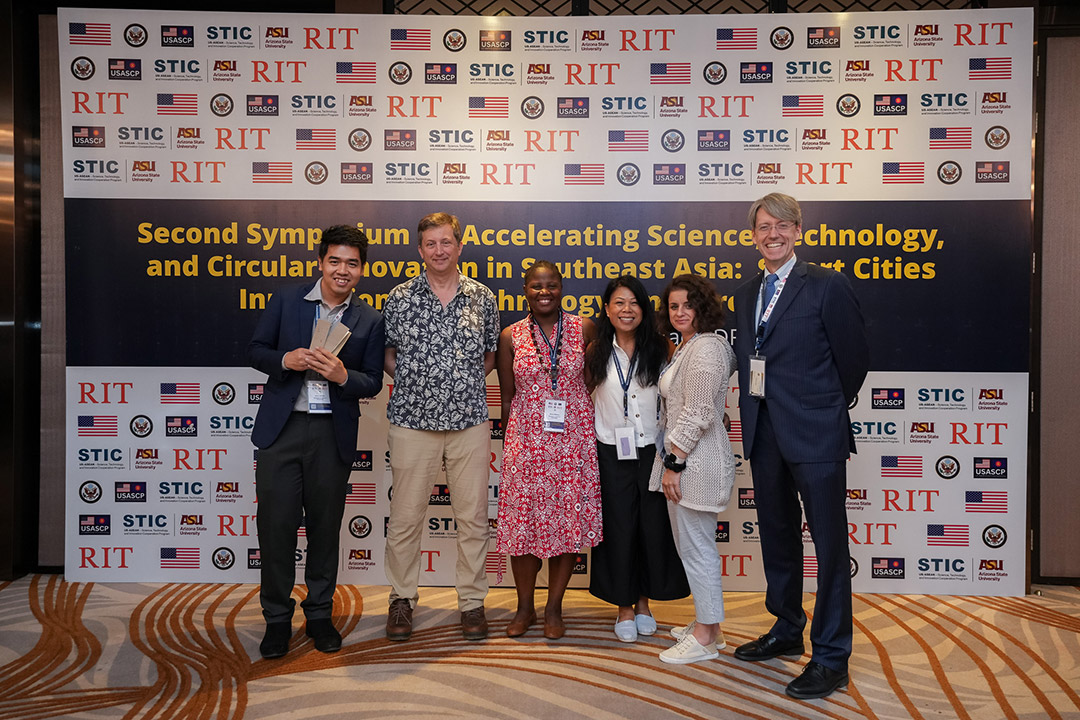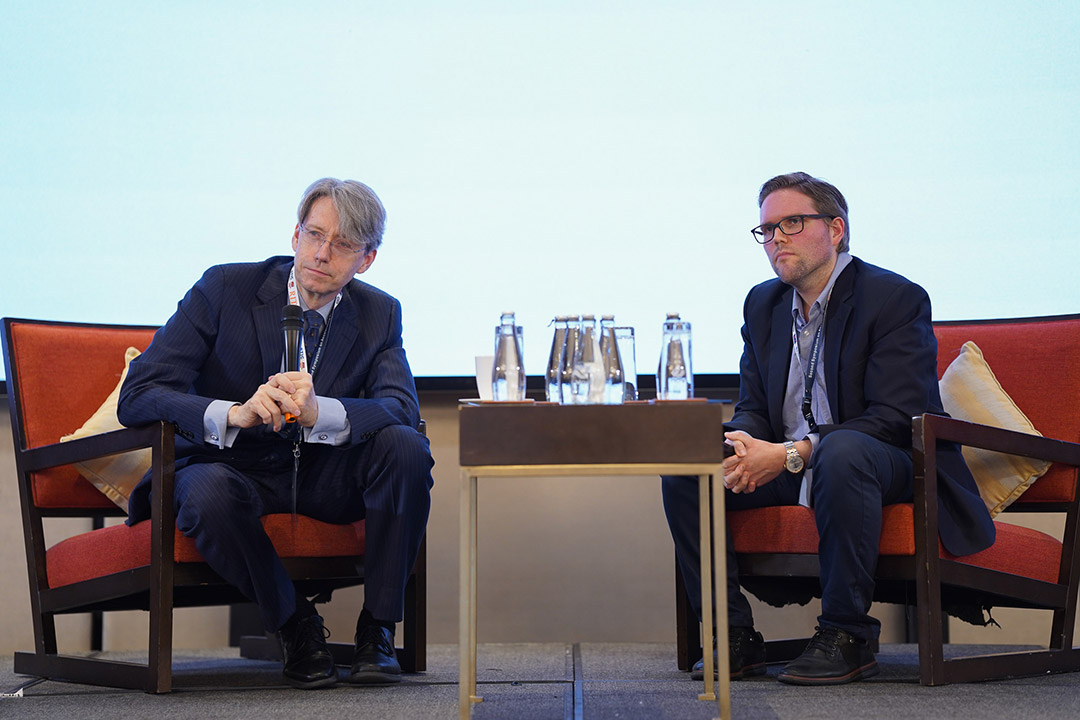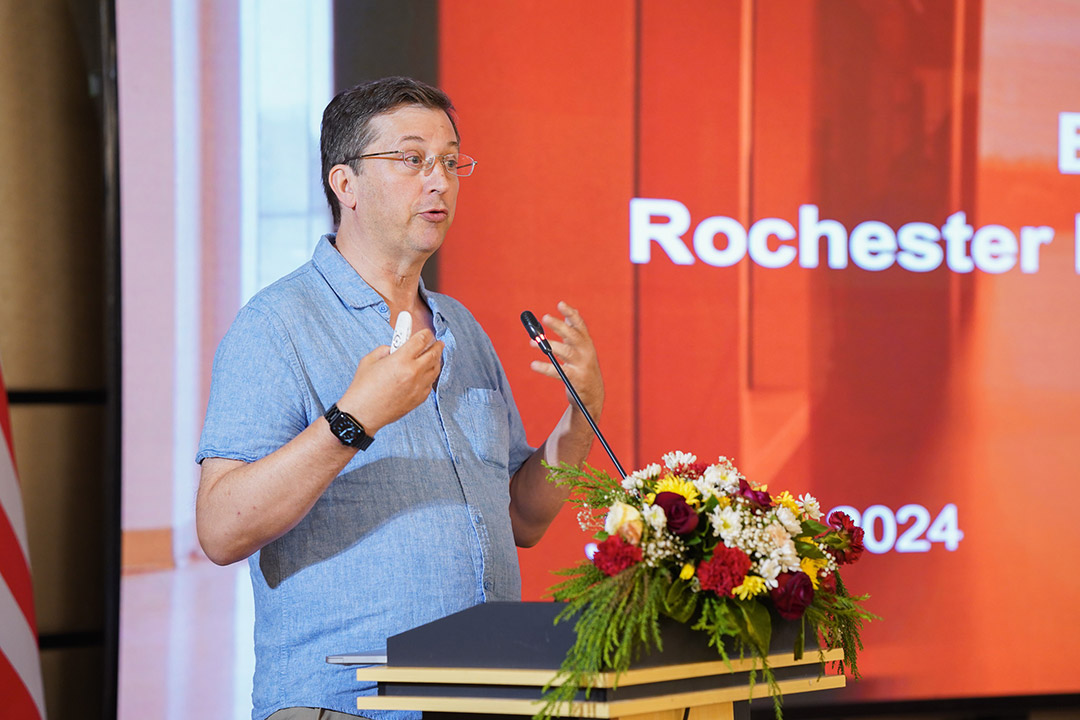RIT expands research on circular economy in Southeast Asia with new funding boost
$1 million extension will help continue to execute entrepreneurship opportunities
Photo provided by Clyde Hull
The cohort of, from left, Khant Oak Soe ’23, Eric Williams, Mihloti Williams, Von Murphy, Israa Ameen Thiab, and Clyde Eirikur Hull represented RIT at the Second Symposium on Accelerating Science, Technology, and Circular Innovation in Vientiane, Laos, this past July. They are working with entrepreneurs and policymakers in the 10 ASEAN region nations to advance circular economy concepts.
Rochester Institute of Technology received a boost in funding recently, as a $1 million grant from the U.S. Department of State will continue the work led by professors Clyde Eirikur Hull and Eric Williams with entrepreneurships based on circular economy principles in member nations of the Association of Southeast Asian Nations (ASEAN).
The circular economy refers to an industrial economy that focuses on reducing waste by reusing and recycling materials. It’s designed to keep products and resources in use for as long as possible through thoughtful design. ASEAN, or Association of Southeast Asian Nations, is a political and economic union of 10 member states that promotes intergovernmental cooperation in a wide range of areas, including the economy, politics, and education. The member states include Brunei Darussalam, Burma, Cambodia, Indonesia, Laos, Malaysia, Philippines, Singapore, Thailand, and Vietnam.
Photo provided by Clyde Hull
RIT Professor Clyde Eirikur Hull takes a question from the audience during the Second Symposium on Accelerating Science, Technology, and Circular Innovation in Vientiane, Laos, this past July.
The one-year extension, made possible through the U.S.-ASEAN Smart Cities Partnership under the leadership of Program Manager Helen Santiago Fink, aims to help organizations in ASEAN countries train entrepreneurs, businesses, and lawmakers to use sustainability science to identify profitable, eco-friendly opportunities. It focuses on developing innovative technologies and business models that strengthen local economies, foster ties with the U.S., and reduce environmental harm. By applying circular economy principles and leveraging the team’s expertise in innovation and technology management, the initiative collaborates with local partners and the State Department to deliver training that supports sustainable business growth and environmental preservation.
The professors are joined by Israa Ameen Thiab, visiting assistant professor at Saunders and a Ph.D. candidate in RIT’s sustainability program; Mihloti Williams, senior program manager at the Competitive Sustainability Center at the Saunders College of Business; research program manager Khant Oak Soe ’23 (technology innovation management and entrepreneurship); and senior program specialist Rachel Spangler ’16 (metals and jewelry design). They will be continuing their circular economy education training with over 50 partners in the ASEAN region, which includes over 37 universities and 15 business incubators and non-profit organizations, while also lending financial support to new circular economy startup companies. In total, more than 100 teachers and nearly 1,000 students have been trained.
Hull, professor of management in RIT’s Saunders College of Business, center director at the Competitive Sustainability Center and the grant’s principal investigator, was grateful for the creative solutions that his team has witnessed from within the region, from businesses finding solutions for food waste, to high-tech plastics recycling, and organic fertilizer stemming from local materials that originally went to waste stations.
“A key lesson we’ve learned is the value of training diverse groups—ranging from those with no work experience or high school education to individuals with advanced degrees,” Hull said. “The people who do our training are starting an amazing array of circular businesses, which is both good for the environment and profits.”
Photo provided by Clyde Hull
RIT professor Eric Williams explains his research on use of end of first-use electronics and the effect of informal recycling in ASEAN member nations.
Williams, professor of sustainability in Golisano Institute for Sustainability (GIS) and co-PI on the grant, focuses his research on the end of first-use electronics and how informal recycling practices impact ASEAN member nations.
“We aim to reduce environmental harm from informal recycling in Asian nations by shifting materials to proper facilities, which are more efficient and environmentally sound,” Williams said. “This approach could yield a win-win-win: greater material recovery, less environmental damage, and improved economic benefits for those in the end-of-use chain, including the informal sector. While outcomes depend on policy and other factors, we’re working to nudge things in the right direction.”
Their research abroad also comes stateside. Thiab recently led a circular economy entrepreneurship workshop at RIT’s Center for Urban Entrepreneurship, bringing insight from practices in her native Jordan to local businesses. The workshop focused on transforming existing business ideas into circular business ventures that both enhance profitability and help reduce the amount of waste going into landfills.
“It’s very exciting to see our work having an impact, making a difference in people’s lives, in the local economy, and for the environment,” Hull said. “Our students and the students of our partners create jobs for themselves and others where there were no jobs, and they make a profit reducing the flow of things into the landfill. That's a great reason to get out of bed in the morning.”
Hull and Williams have established expertise in circular economy entrepreneurship, especially when applied in developing nations to benefit the local economy and environment.
Hull has decades of experience working with entrepreneurs through RIT’s Simone Center for Innovation and Entrepreneurship, Venture Creations, and the aforementioned Center for Urban Entrepreneurship and Competitive Sustainability Center. Williams was the recipient of a National Science Foundation grant to research international electronic waste, the results of which influenced the environmental standard for computers in the United States. In addition to the original grant from the State Department, the team has also received funding to help entrepreneurs in the Middle East form circular economy businesses.
As part of the funding, the group will hold its third annual Symposium on Accelerating Science, Technology, and Circular Innovation in July 2025 in Kuala Lumpur, Malaysia.












